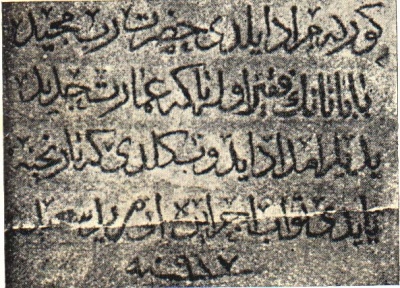Template:Today's featured article: Difference between revisions
Navroopsehmi (talk | contribs) No edit summary |
|||
| Line 1: | Line 1: | ||
== | ==Guru Nanak in Baghdad== | ||
[[Image:Inscription on stone slab.jpg|400px|thumb|'''Inscription on a stone slab found in Baghdad''' : "Behold! How a wish has been fulfilled by Holy and High Providence. That the building of Baba Nanak has been newly built with the help of seven autat (great valis). | |||
That the happy murad of God (Baba Nanak) has started a fountain of grace issuing new water in the land. 917 Hijri (1511 AD)"|centre]] | |||
'''[[ | Swami Ananda Acharya visted the shirne of Guru Nanak in Baghdad and wrote the following: | ||
''Upon this simple slab of granite did thou sit, discoursing of fraternal love and holy light, O Guru Nanak, Prince among India’s holy sons.'' | |||
''What song from the source of Seven Waters thou didst sing to charm the soul of Iran!'' | |||
''What place from Himalaya’s lonely caves and forests thou didst carry to the vinegroves and rose-gardens of Baghdad?'' | |||
''What light from Badrinath’s snowy peak thou didst bear to illumine the heart of Bahlol, thy saintly Persian disciple?'' | |||
''Eighty-four nights Bahlol hearkened to thy words of Life and the Path and Spring Eternal, while the moon waxed and waned in the pomegranate grove beside the grassy desert of the dead.'' | |||
''And after thou hast left him to return to thy beloved Bharat’s land, the fakir, it is said, would speak to none nor listen to the voice of man or angel;'' | |||
''His fame spread far and wide and the Shah came to pay his homage, but the holy man would take no earthly treasures nor hear the praise of kings and courtiers.'' | |||
''Thus lived he - lonely, devoted, thoughtful - sixty winters, sitting before the stone whereon thy sacred feet had rested.'' | |||
''And ere he left this house of Ignorance he wrote these words on the stone: “Here spake the Hindu Guru Nanak to Fakir Bahlol, and for these sixty winters since the Guru left Iran, the soul of Bahlol has rested on the Master’s word, like a bee poised on a dawnlit honey-rose."'' | |||
'''[[Guru Nanak in Baghdad|....Continued]]''' | |||
Revision as of 03:42, 23 May 2005
Guru Nanak in Baghdad

Swami Ananda Acharya visted the shirne of Guru Nanak in Baghdad and wrote the following:
Upon this simple slab of granite did thou sit, discoursing of fraternal love and holy light, O Guru Nanak, Prince among India’s holy sons.
What song from the source of Seven Waters thou didst sing to charm the soul of Iran!
What place from Himalaya’s lonely caves and forests thou didst carry to the vinegroves and rose-gardens of Baghdad?
What light from Badrinath’s snowy peak thou didst bear to illumine the heart of Bahlol, thy saintly Persian disciple?
Eighty-four nights Bahlol hearkened to thy words of Life and the Path and Spring Eternal, while the moon waxed and waned in the pomegranate grove beside the grassy desert of the dead.
And after thou hast left him to return to thy beloved Bharat’s land, the fakir, it is said, would speak to none nor listen to the voice of man or angel;
His fame spread far and wide and the Shah came to pay his homage, but the holy man would take no earthly treasures nor hear the praise of kings and courtiers.
Thus lived he - lonely, devoted, thoughtful - sixty winters, sitting before the stone whereon thy sacred feet had rested.
And ere he left this house of Ignorance he wrote these words on the stone: “Here spake the Hindu Guru Nanak to Fakir Bahlol, and for these sixty winters since the Guru left Iran, the soul of Bahlol has rested on the Master’s word, like a bee poised on a dawnlit honey-rose."
